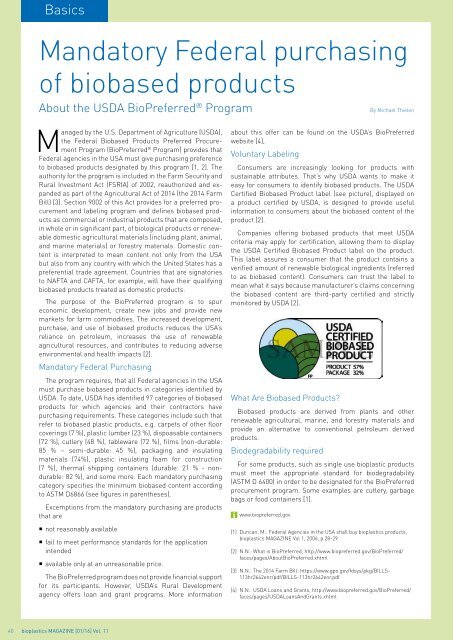Issue 01/2016
Automotive Foam Basics: Public Procurement
Automotive
Foam
Basics: Public Procurement
Create successful ePaper yourself
Turn your PDF publications into a flip-book with our unique Google optimized e-Paper software.
Basics<br />
Mandatory Federal purchasing<br />
of biobased products<br />
About the USDA BioPreferred ® Program<br />
By Michael Thielen<br />
Managed by the U.S. Department of Agriculture (USDA),<br />
the Federal Biobased Products Preferred Procurement<br />
Program (BioPreferred ® Program) provides that<br />
Federal agencies in the USA must give purchasing preference<br />
to biobased products designated by this program [1, 2]. The<br />
authority for the program is included in the Farm Security and<br />
Rural Investment Act (FSRIA) of 2002, reauthorized and expanded<br />
as part of the Agricultural Act of 2<strong>01</strong>4 (the 2<strong>01</strong>4 Farm<br />
Bill) [3]. Section 9002 of this Act provides for a preferred procurement<br />
and labeling program and defines biobased products<br />
as commercial or industrial products that are composed,<br />
in whole or in significant part, of biological products or renewable<br />
domestic agricultural materials (including plant, animal,<br />
and marine materials) or forestry materials. Domestic content<br />
is interpreted to mean content not only from the USA<br />
but also from any country with which the United States has a<br />
preferential trade agreement. Countries that are signatories<br />
to NAFTA and CAFTA, for example, will have their qualifying<br />
biobased products treated as domestic products.<br />
The purpose of the BioPreferred program is to spur<br />
economic development, create new jobs and provide new<br />
markets for farm commodities. The increased development,<br />
purchase, and use of biobased products reduces the USA’s<br />
reliance on petroleum, increases the use of renewable<br />
agricultural resources, and contributes to reducing adverse<br />
environmental and health impacts [2].<br />
Mandatory Federal Purchasing<br />
The program requires, that all Federal agencies in the USA<br />
must purchase biobased products in categories identified by<br />
USDA. To date, USDA has identified 97 categories of biobased<br />
products for which agencies and their contractors have<br />
purchasing requirements. These categories include such that<br />
refer to biobased plastic products, e.g. carpets of other floor<br />
coverings (7 %), plastic lumber (23 %), dispoasable containers<br />
(72 %), cutlery (48 %), tableware (72 %), films (non-durable:<br />
85 % – semi-durable: 45 %), packaging and insulating<br />
materials (74%), plastic insulating foam for construction<br />
(7 %), thermal shipping containers (durable: 21 % - nondurable:<br />
82 %), and some more. Each mandatory purchasing<br />
category specifies the minimum biobased content according<br />
to ASTM D6866 (see figures in parentheses).<br />
Excemptions from the mandatory purchasing are products<br />
that are<br />
• not reasonably available<br />
• fail to meet performance standards for the application<br />
intended<br />
• available only at an unreasonable price.<br />
The BioPreferred program does not provide financial support<br />
for its participants. However, USDA’s Rural Development<br />
agency offers loan and grant programs. More information<br />
about this offer can be found on the USDA’s BioPreferred<br />
website [4],<br />
Voluntary Labeling<br />
Consumers are increasingly looking for products with<br />
sustainable attributes. That’s why USDA wants to make it<br />
easy for consumers to identify biobased products. The USDA<br />
Certified Biobased Product label (see picture), displayed on<br />
a product certified by USDA, is designed to provide useful<br />
information to consumers about the biobased content of the<br />
product [2].<br />
Companies offering biobased products that meet USDA<br />
criteria may apply for certification, allowing them to display<br />
the USDA Certified Biobased Product label on the product.<br />
This label assures a consumer that the product contains a<br />
verified amount of renewable biological ingredients (referred<br />
to as biobased content). Consumers can trust the label to<br />
mean what it says because manufacturer’s claims concerning<br />
the biobased content are third-party certified and strictly<br />
monitored by USDA [2].<br />
What Are Biobased Products?<br />
Biobased products are derived from plants and other<br />
renewable agricultural, marine, and forestry materials and<br />
provide an alternative to conventional petroleum derived<br />
products.<br />
Biodegradability required<br />
For some products, such as single use bioplastic products<br />
must meet the appropriate standard for biodegradability<br />
(ASTM D 6400) in order to be designated for the BioPreferred<br />
procurement program. Some examples are cutlery, garbage<br />
bags or food containers [1].<br />
www.biopreferred.gov<br />
[1] Duncan, M.: Federal Agencies in the USA shall buy bioplastics products,<br />
bioplastics MAGAZINE Vol 1, 2006, p 28-29<br />
[2] N.N.: What is BioPreferred, http://www.biopreferred.gov/BioPreferred/<br />
faces/pages/AboutBioPreferred.xhtml<br />
[3] N.N.: The 2<strong>01</strong>4 Farm Bill: https://www.gpo.gov/fdsys/pkg/BILLS-<br />
113hr2642enr/pdf/BILLS-113hr2642enr.pdf<br />
[4] N.N.: USDA Loans and Grants, http://www.biopreferred.gov/BioPreferred/<br />
faces/pages/USDALoansAndGrants.xhtml<br />
40 bioplastics MAGAZINE [<strong>01</strong>/16] Vol. 11


















